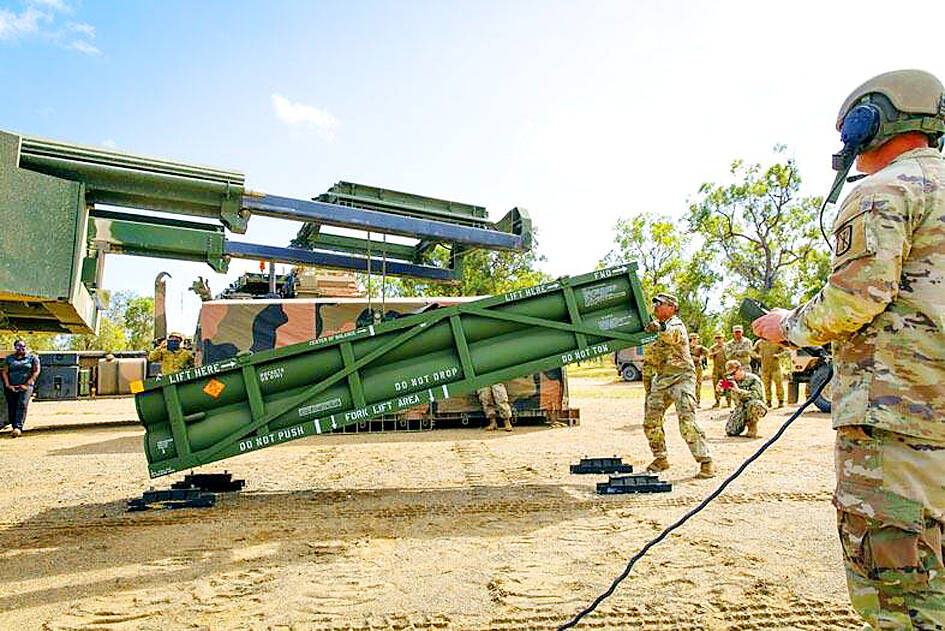The US has accelerated its delivery of military equipment purchased by Taiwan, including 16 Army Tactical Missile Systems (ATACMS) that arrived on Jan. 7, the Ministry of National Defense (MND) said, greatly bolstering the nation’s capability to deter military aggression from the Chinese People’s Liberation Army (PLA).
Apart from 84 long-range guided missiles, the defense package also includes 29 sets of M142 High Mobility Artillery Rocket System (HIMARS), a light multiple rocket launcher developed in the late 1990s for the US Army, as well as 64 precision rockets, two training simulators and associated equipment, the ministry said in its latest written report to the legislature.
For the procurement of the defense package, the ministry had allocated a budget of NT$32.52 billion (US$1.08 billion) that was to be paid out from 2020 to 2027.

Photo: CNA
The ATACMS, which have a shooting range of 300km, are scheduled to be delivered in two phases: 64 in the first phase and 20 in the second phase.
The first batch of 64 missiles —16 in total — arrived on Jan. 7, the report said, with the remaining 48 missiles scheduled to arrive during the first quarter. That means all 64 should have arrived if the delivery was on schedule.
Eleven sets of HIMARS and two training simulators were received on Sept. 26 last year.

Photo courtesy of the US Army via AP
Meanwhile, 18 sets of HIMARS, 20 ATACMS and 864 precision rockets are scheduled to arrive between next year and 2027.
To ensure on-time delivery, the ministry has project liaison officers stationed in the US to audit the production progress at US military arsenals every two months. This is to ensure strict oversight, and that the second batch of equipment and ammunition is completed and delivered between next year and 2027, the ministry said.
The first batch of 38 M1 tanks and five missile launch vehicles from the first batch of the shore-based Harpoon missile system have also arrived in Taiwan, the ministry added.

MAKING WAVES: China’s maritime militia could become a nontraditional threat in war, clogging up shipping lanes to prevent US or Japanese intervention, a report said About 1,900 Chinese ships flying flags of convenience and fishing vessels that participated in China’s military exercises around Taiwan last month and in January last year have been listed for monitoring, Coast Guard Administration (CGA) Deputy Director-General Hsieh Ching-chin (謝慶欽) said yesterday. Following amendments to the Commercial Port Act (商港法) and the Law of Ships (船舶法) last month, the CGA can designate possible berthing areas or deny ports of call for vessels suspected of loitering around areas where undersea cables can be accessed, Oceans Affairs Council Minister Kuan Bi-ling (管碧玲) said. The list of suspected ships, originally 300, had risen to about

DAREDEVIL: Honnold said it had always been a dream of his to climb Taipei 101, while a Netflix producer said the skyscraper was ‘a real icon of this country’ US climber Alex Honnold yesterday took on Taiwan’s tallest building, becoming the first person to scale Taipei 101 without a rope, harness or safety net. Hundreds of spectators gathered at the base of the 101-story skyscraper to watch Honnold, 40, embark on his daredevil feat, which was also broadcast live on Netflix. Dressed in a red T-shirt and yellow custom-made climbing shoes, Honnold swiftly moved up the southeast face of the glass and steel building. At one point, he stepped onto a platform midway up to wave down at fans and onlookers who were taking photos. People watching from inside

Japan’s strategic alliance with the US would collapse if Tokyo were to turn away from a conflict in Taiwan, Japanese Prime Minister Sanae Takaichi said yesterday, but distanced herself from previous comments that suggested a possible military response in such an event. Takaichi expressed her latest views on a nationally broadcast TV program late on Monday, where an opposition party leader criticized her for igniting tensions with China with the earlier remarks. Ties between Japan and China have sunk to the worst level in years after Takaichi said in November that a hypothetical Chinese attack on Taiwan could bring about a Japanese

STREAMLINED: The dedicated funding would allow the US to transfer equipment to Taiwan when needed and order upgraded replacements for stockpiles, a source said The US House of Representatives on Thursday passed a defense appropriations bill totaling US$838.7 billion, of which US$1 billion is to be allocated to reinforcing security cooperation with Taiwan and US$150 million to replace defense articles provided to the nation. These are part of the Consolidated Appropriation Act, which the US House yesterday passed with 341 votes in favor and 88 against. The act must be passed by the US Senate before Friday next week to avoid another government shutdown. The US House Committee on Appropriations on Monday unveiled the act, saying that it allocates US$1 billion for the Taiwan Security Cooperation Initiative